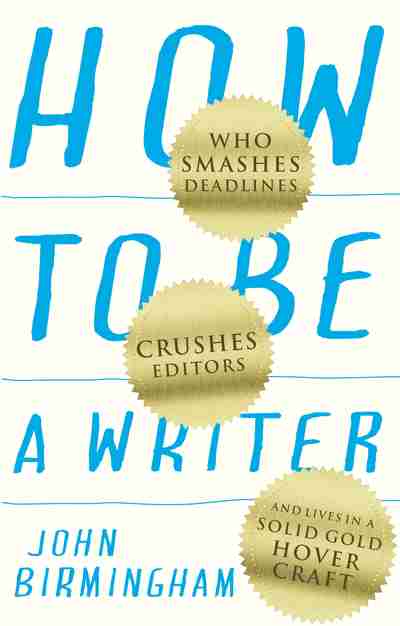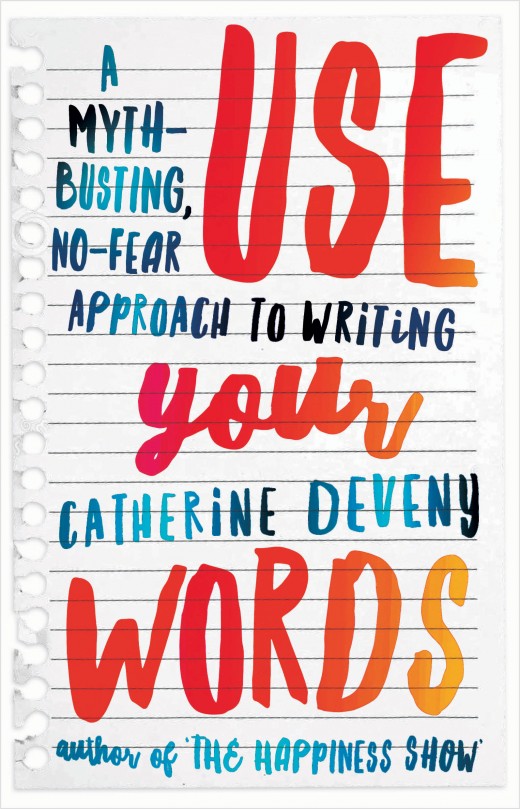 Reviewed by Sue Bond
Reviewed by Sue Bond
How to Be a Writer
by John Birmingham
New South Books
Paperback, 244pp, 2016, ISBN: 97817422234847
 Use Your Words
Use Your Words
by Catherine Deveny
Black Inc.
Paperback, 303pp, 2016, ISBN: 9781863958349
Books on writing for writers are legion. Anne Lamott wrote Bird by Bird: some instructions on writing and life (1994) and in it tells the story of her ten year old brother needing help with an essay on birds that he had left until the very last minute to complete. When he expressed despair at ever being able to write it in such a short time, their father advises him to take it ‘bird by bird’ (19). Stephen King published On Writing: a memoir of the craft (2000) and wrote in the second Foreword that ‘This is a short book because most books about writing are filled with bullshit’ (except, he says, Strunk and White’s Elements of Style). The Writing Life (1989) and Living by Fiction (1982) are Annie Dillard’s elegant and deeply satisfying contributions; Natalie Goldberg has produced several spiritually-orientated volumes, such as Writing Down the Bones: freeing the writer within (1986); Kate Grenville wrote The Writing Book (1993) and Making Stories: how ten Australian novels were written (1993; updated 2001) with Sue Woolfe, who herself has written The Mystery of the Cleaning Lady: a writer looks at creativity and neuroscience (2007), in which she describes her process of amassing words towards the creation of a novel. The writer and teacher of writing John Gardner contributed On Becoming a Novelist (1983) shortly before his death; Margaret Atwood has written Negotiating with the Dead: a writer on writing (2003).
Add to these dozens and dozens more. And the Paris Review Interviews series, which are books about writing and writers’ lives gleaned through talking to writers themselves. And the numerous ‘how to’ books that contain exercises, and the books on the business of writing and being a writer. And the books that are anthologies of writers’ quotations on writing.
So do we need any more? Whether we do or not, John Birmingham has produced one, and it’s called How to Be a Writer: who smashes deadlines, crushes editors, and lives in a solid gold hovercraft, and I think it’s a worthwhile addition to the library, even if only for the subtitle. He’s managed to find an angle that is just different enough, with an Australian flavour and raucous humour, to deserve a place on the bookshelves of writers. But wait, Catherine Deveny has also written a writing book! She’s called hers Use Your Words: a myth-busting, no-fear approach to writing, and it is possibly the most useful and practical book for procrastinating writers I have read.
If you have read anything of John Birmingham’s before, such as the infamous He Died with a Felafel in his Hand (1994), you will know that he can be funny and scatological. But he has written much more than the house-sharing book, such as Leviathan: the unauthorised biography of Sydney (1999), two Quarterly Essays (Appeasing Jakarta and A Time for War), and a series of military action-adventure novels. He also writes columns for publications like the Monthly and the Sydney Morning Herald.
In How to Be a Writer, he is free with the swearing and the sexual metaphors, but also with solid advice about tackling writerly problems and going about making a living out of writing. The first part of the book deals with issues such as finding your voice as a writer, the need to specialise in the ever-changing world of publishing, getting a routine established (just not one like Hunter S Thompson’s, too much cocaine), and using technology to your advantage. But also using the good old-fashioned paper notebook, and taking it around with you wherever you go to write in ideas that come to you at any moment.
He quotes well known writers throughout, and discusses some particularly useful ideas and thoughts, such as that of George RR Martin, who divides writers into gardeners and architects. The gardeners ‘just dig a hole and plant the seed and see what comes up’ whereas the architects ‘do blueprints before they drive the first nail’ (56), and then there are those who do a bit of both, depending on the project. He reminds us that a draft is just that, a draft, and is meant to be terrible and worked on until its better.
Birmingham tells stories to illustrate his points and to entertain, including a hilarious one about his successful foray into debt collecting for a friend. He gives helpful guidance on getting into self-publishing and describes how to go about using tools such as social media to your advantage.
Catherine Deveny also writes humorously in Use Your Words but with less swearing. She is a comedian and columnist and has written several books, including the novel The Happiness Show (2013), and runs very popular writing masterclasses called Gunnas. I can see why they are popular, if they are anything like this book.
Deveny divides it into four parts: ‘The Truth About Writing’; ‘Principles’; ‘Writing Toolkit’; and ‘Overcoming Obstacles’. There are gems in each section. The first deals with the difficulties of writing, such as procrastination, overcoming lack of confidence, ‘thinking your work is crap’, and ‘worrying about what other people think’ (49). Some of the advice she gives seems obvious, but remember that often it’s the obvious we forget first.
‘Principles’ contains some of the most useful notes on writing that I’ve come across. Specifically, she writes things like ‘An artist is simply someone who starts stuff and finishes it. Then starts something else’ (50), ‘If you never have a proper stab at writing, you will never fail’ (51), and ‘Do the writing first. Anything you are tempted to procrastinate with, write down on a piece of paper and use it as a reward’ (63). If you ‘think your writing is shit’ then there’s this:
You know when you are good enough to run a marathon? Only after you have run one. Are you with me? Same thing goes for writing. You are only good enough to write That Thing after you have written it. You learn as you go. You level up as you grind. You get as good as you can be by simply repeating the task. You are always better at the end than at the start. (67)
I particularly like the chapter ‘Motivation Follows Action’ because it gets rid of that idea that you look somewhere else to get motivated. Deveny believes you get motivated to write by writing. ‘Listen to your body. Notice how tense and bunched up you feel when you faff around the house instead of writing’ and then she asks you to notice how you feel when you actually get some writing done: ‘Tinker bell, sunshine, champagne’ (133). And then, one more example of why this book is extremely useful for those of us who are master procrastinators, in a later chapter she details how to talk back to that voice that wants you to check Facebook/dust the bookcase/worry about what people will think of your writing. And she repeats some of these ideas and tips so it cements into your memory.
Further on she writes about interesting tricks for managing writing time like the Pomodoro Technique, where you break up your work time by using a tomato-shaped kitchen timer and setting it to ring after twenty-five minutes. Then you take a five minute break and so forth. Birmingham also describes this method, which I admit I had not heard of before. Deveny also reveals her dyslexia and that of her son, and the difficulties encountered, the difficulties overcome.
About the only paragraph I disagree with in this book is on page 244, when Deveny expresses her belief that to be a writer you do not need to read voraciously, but ‘think a lot, listen a lot, do a lot’. I do not quarrel with these but I do believe that reading other people’s novels, short stories, poetry, biographies, memoirs, non-fiction generally is vitally important. You learn a lot about writing, as well as everything else, and what’s the point of all our writing if no one reads it? I understand it is a difficult process for people with dyslexia, but as Deveny illustrates, it can be done differently and the problems overcome.
I would recommend both of these, but particularly Use your words for its down-to-earth recommendations for beating procrastination and other common blockers for writers. Writing books are worth re-visiting, and new ones are worth reading, because writers often need to be reminded of the obvious and simple points about getting the words down, ‘bird by bird’.
About the reviewer: Sue Bond is a writer and reviewer living in Brisbane.